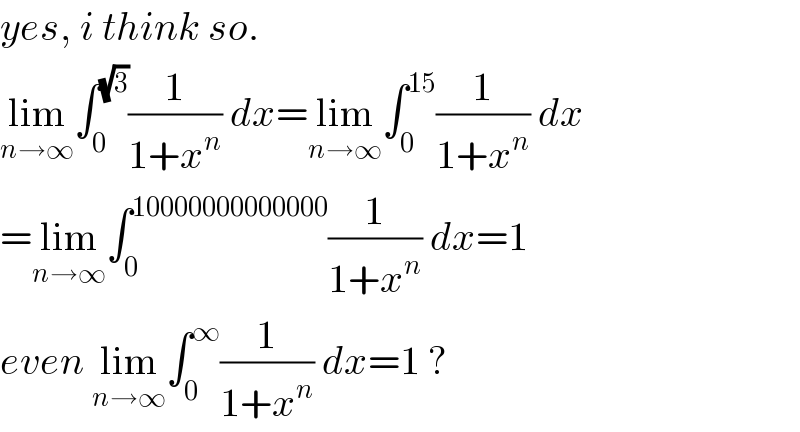
Question and Answers Forum
Question Number 80882 by mr W last updated on 07/Feb/20

Commented by jagoll last updated on 07/Feb/20

Commented by ajfour last updated on 07/Feb/20

Commented by mr W last updated on 07/Feb/20

Commented by mathmax by abdo last updated on 07/Feb/20
![let I_n =∫_0 ^(√3) (dx/(1+x^n )) ⇒I_n =∫_R (1/(1+x^n )) χ_([0,(√(3]))) (x)dx =∫_R f_n (x)dx with f_n (x)=(1/(1+x^n )) χ_([0,(√3)]) (x)dx if 0≤x<1 f_n →χ_([0,(√3)]) (x)=1 ⇒lim_(n→+∞) I_n =(√3) if x>1 f_n →0 (s.c) and we have x^n >1 ⇒(1/(1+x^n ))χ_([0,(√3)]) (x)<(1/2)χ_([0,(√3)]) (x) theorem of convergence dominee give lim_(n→+∞) ∫_R f_n (x)dx =∫_R lim_(n→+∞) f_n (x)dx =0](Q80910.png)
Answered by ~blr237~ last updated on 07/Feb/20
![let g(a)= lim_(n→∞) ∫_0 ^a f_n (x) dx with f_n (x)=(1/(1+x^n )) ,a>0 we have ∀ x∈[0,a] 0<(a/(1+a^n ))≤∫_0 ^a (1/(1+x^n ))dx ≤ a so ∀ n f_n is integrable and (∫_0 ^a f_n (x)dx)_(n≥1) is confined if x∈[0,1] x^(n+1) ≤x^n and f_n (x)≤f_(n+1) (x) if x∈[1:∞[ x^n <x^(n+1) and f_(n+1) (x)≤f_n (x) then (f_n ) is monotone :so due to CSM lim_(n→∞) ∫_0 ^a f_n (x)dx=∫_0 ^a lim_(n→∞) f_n (x)dx= { ((∫_0 ^a 1dx if a<1)),((∫_0 ^1 1dx +∫_1 ^a 0dx if a≥1)) :}= { ((a if a<1)),((1 if a≥1)) :} lim_(n→∞) ∫_0 ^∞ (1/(1+x^n ))dx=lim_(a→∞) g(a) = 1](Q80905.png)
Commented by mr W last updated on 07/Feb/20

